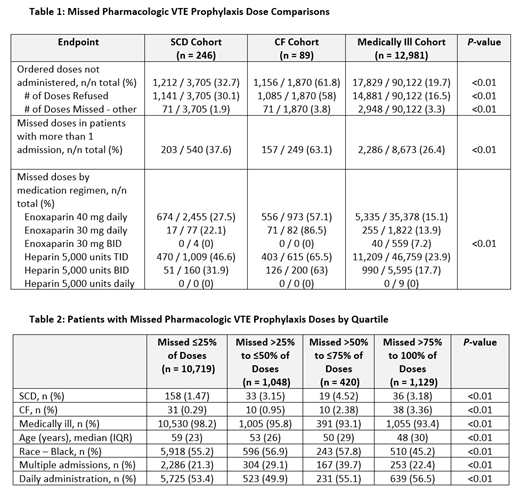Abstract
Background:
Sickle cell disease (SCD) and cystic fibrosis (CF) are associated with an increased risk of venous thromboembolism (VTE). VTE prophylaxis non-administration is a risk factor for VTE. Since many patients with SCD or CF experience frequent hospitalizations, we hypothesized that missed doses of VTE prophylaxis may be common in these populations. The purpose of this study was to characterize VTE prophylaxis non-administration among patients with SCD or CF compared to medically ill patients without SCD or CF.
Methods:
We conducted a single-center retrospective cohort study of patient admissions from July 1 st, 2016 to December 31 st, 2019 who were prescribed at least 2 doses of pharmacologic VTE prophylaxis. Three adult inpatient cohorts were defined: patients with SCD, patients with CF, and medically ill patients without SCD or CF. We excluded patients on pediatric and surgical units, and excluded doses received while in intensive care units or prescribed as once doses. The primary outcome was the proportion of missed doses of VTE prophylaxis by cohort. Secondary outcomes included the proportion of patients who missed at least one dose by cohort, the proportion of missed doses by medication and frequency, and the proportion of missed doses in patients with more than one admission during the study period. Multivariable logistic regression was used to identify characteristics associated with non-administration.
Results:
The 13,316 subjects included 246 with SCD, 89 with CF, and 12,981 medically ill. Subjects with SCD and CF were younger than medically ill patients [median (IQR) age 31 (16) and 30 (11) years, respectively versus 58 (24) years, p<0.01]. A higher number of SCD and CF patients had multiple hospital admissions than medically ill patients (52.5% and 73.0%, respectively vs. 21.8%, p<0.01). VTE prophylaxis dose non-administration overall and by prescribed regimen are shown in Table 1. During the study period, 95,697 doses were prescribed; 32.7% were not administered in the SCD cohort, 61.8% in the CF cohort, and 19.7% in the medically ill cohort (p<0.01). In the multivariable logistic regression, SCD diagnosis [odds ratio (OR) 1.73, 95% confidence interval (CI) 1.29-2.32], CF diagnosis (OR 4.64, 95% CI 2.98-7.21), age < 30 years (OR 2.29, 95% CI 1.98-2.63), and multiple admissions (OR 1.13, 95% CI 1.01-1.26) were associated with non-administration of one or more doses. Black race (OR 0.86, 95% CI 0.78-0.95) and receiving a once daily prophylaxis regimen (OR 0.76, 95% CI 0.69-0.84) were associated with reduced odds of missing a dose. Patients with SCD, patients with CF, and younger patients missed greater proportions of their individually prescribed doses (Table 2).
Conclusion:
Patients with SCD or CF missed a larger proportion of pharmacologic VTE prophylaxis compared to medically ill patients. Factors independently associated with increased odds of non-administration include age < 30 years and multiple hospital admissions. Black race and once daily administration were associated with decreased odds of non-administration. These findings suggest that targeted education or once-daily dosing may improve VTE prevention in high-risk lifelong disorders such as SCD and CF.
Naik: Rigel: Research Funding. Lanzkron: GBT: Research Funding; Shire: Research Funding; Novo Nordisk: Consultancy; Teva: Current holder of individual stocks in a privately-held company; Pfizer: Current holder of individual stocks in a privately-held company; Imara: Research Funding; CSL Behring: Research Funding; Novartis: Research Funding; Bluebird Bio: Consultancy. Dane: Sanofi Genzyme: Honoraria; Janssen: Honoraria; Alexion: Honoraria.


